|
|
|
Sort Order |
|
|
|
Items / Page
|
|
|
|
|
|
|
| Srl | Item |
| 1 |
ID:
114859
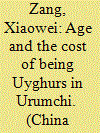

|
|
|
|
|
| Publication |
2012.
|
| Summary/Abstract |
This article asks: is the cost of being Uyghurs higher for young Uyghurs than for old Uyghurs in Ürümchi? I address this question with data from a survey of 2,947 people conducted in Ürümchi in 2005. The cost of being Uyghurs refers to the extent of economic inequality in the earnings of Han Chinese and Uyghurs. I develop three hypotheses on the effect of age on earnings differentials between Han Chinese and Uyghurs. Data analyses show that although young Uyghurs are better educated and earn more than old Uyghurs, they are more likely than old Uyghurs to suffer from being Uyghurs in Ürümchi. This finding has policy implications for the reduction of ethnic disparity in Xinjiang.
|
|
|
|
|
|
|
|
|
|
|
|
|
|
|
|
| 2 |
ID:
114858


|
|
|
|
|
| Publication |
2012.
|
| Summary/Abstract |
A recent addition to the global discourse of China's interaction with developing countries has been the claim that the Chinese government exports prison labour to these countries. While no evidence is ever presented to support this claim, it has been widely circulated in international and local media, as well as on the internet. This article examines the origins of the rumour and the mechanisms of its transmission. It shows that while the rumour often originates at the grass roots in developing countries, it is promoted locally and globally by political, economic and media elites with distinct agendas that often involve building support for opposition parties, competition in obtaining contracts, or geo-strategic and ideological rivalry. We analyse the rumour's circulation in light of the larger discourse on China and developing countries, and discuss why Chinese official responses to the claim have proved to be ineffective.
|
|
|
|
|
|
|
|
|
|
|
|
|
|
|
|
| 3 |
ID:
114860
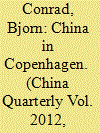

|
|
|
|
|
| Publication |
2012.
|
| Summary/Abstract |
The contradiction between the astonishing dynamic of China's domestic climate policy agenda and its seemingly tenacious position in international climate negotiations presents a puzzle that, on closer inspection, reveals much about a nation at the crossroads, undecided which way to turn. The alterations in China's political interests connected to the issue of climate change are clearly evident in the domestic policy changes China introduced during previous years. However, China's leadership thus far has remained hesitant to translate this new set of interests fully into a coherent position in the international arena. China's mounting difficulties in reconciling its rapidly changing role on the international stage with its altered domestic situation, as well as its traditional foreign policy interests and principles, undermine its ability to pursue a consistent and effective strategy in international climate negotiations. China's reluctance to redefine its role in the international arena has led to a number of inconsistencies that particularly plagued its position during the Copenhagen conference, adding to the overall non-constructive dynamic of the proceedings that ultimately left China, as everyone else, with empty hands. The Copenhagen negotiations demonstrated that China's leadership will have to address these inconsistencies resolutely if it wants to realize the benefits that international climate cooperation offers.
|
|
|
|
|
|
|
|
|
|
|
|
|
|
|
|
| 4 |
ID:
114856
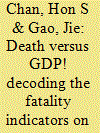

|
|
|
|
|
| Publication |
2012.
|
| Summary/Abstract |
This article examines how Chinese reformers have used a set of "fatality indicators" to deal with the serious work safety situation in the past two decades. It argues that the system of fatality indicators is a prudent strategy to tackle the responsibility deficiencies in the previous work safety regulatory system and strengthen the central government's supervision over local safety management. The primary purpose of implementing the fatality indicators is to shift local officials' focus from a GDP-centred growth mode to a new mindset of achieving a balance between economic development and social stability in local governance. The article also indicates that the decline in work-related fatalities in recent years is evidence of the effectiveness of the fatality indicators. These achievements aside, however, the introduction of fatality indicators is closely associated with an increase in local officials' dishonest reporting of real death tolls and the fluctuation in very serious accidents.
|
|
|
|
|
|
|
|
|
|
|
|
|
|
|
|
| 5 |
ID:
114861
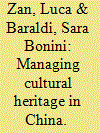

|
|
|
|
|
| Publication |
2012.
|
| Summary/Abstract |
This article investigates change processes regarding the managerial aspects of organizing cultural heritage activities in China. The focus is not on the historical and artistic meanings of archaeological discoveries in themselves; nor on the technical, scientific and methodological repercussions of conservation and restoration; nor on the evolution of museology per se. Rather, the core of the analysis is on new managerial problems along the "archaeological chain" (archaeological discoveries, restoration, museum definition and public access to cultural heritage) posed by new professional discourse and the overall evolution of the economic and political context. The article is based on field research carried out in Luoyang, Henan province. The micro view adopted (managing practices more than policies), and the unusual access to data (including financial figures on individual entities) represent a unique opportunity for a sort of "journey" inside the Chinese public sector.
|
|
|
|
|
|
|
|
|
|
|
|
|
|
|
|
| 6 |
ID:
114854
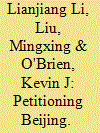

|
|
|
|
|
| Publication |
2012.
|
| Summary/Abstract |
What precipitated the 2003-06 "high tide" of petitioning Beijing and why did the tide wane? Interviews and archival sources suggest that a marked increase in petitioners coming to the capital was at least in part a response to encouraging signals that emerged when Hu Jintao and Wen Jiabao adopted a more populist leadership style. Because the presence of tens of thousands of petitioners helped expose policy failures of the previous leadership team, the Hu-Wen leadership appeared reasonably accommodating when petitioners arrived en masse in Beijing. Soon, however, the authorities shifted towards control and suppression, partly because frustrated petitioners employed disruptive tactics to draw attention from the Centre. In response to pressure from above, local authorities, especially county leaders, turned to coercion to contain assertive petitioners and used bribery to coax officials in the State Bureau of Letters and Visits to delete petition registrations. The high tide receded in late 2006 and was largely over by 2008. This article suggests that a high tide is more likely after a central leadership change, especially if a populist programme strikes a chord with the population and elite turnover augments confidence in the Centre and heightens expectations that it will be responsive to popular demands.
|
|
|
|
|
|
|
|
|
|
|
|
|
|
|
|
| 7 |
ID:
114857


|
|
|
|
|
| Publication |
2012.
|
| Summary/Abstract |
Sino-Soviet-American relations during 1969 followed a chaotic course. Scholars have asserted in the past that the Sino-Soviet border conflict in March led to Sino-American rapprochement in December. However, evidence from China, the former socialist world and the United States undermines the interpretation of a purposeful and planned policy of any of the three actors to the others. None had a formulated policy or strategy in place. China lacked the governmental ability to chart a clear course, the United States underwent a presidential transition, and neither it nor the Soviet Union had meaningful diplomatic relations with the People's Republic. In this context, the border clashes, intended by China to reassert territorial claims on a small island, led to a complex web of actions and interactions between the three countries that was based on mutual misunderstanding, lack of communication, exaggerated threat perceptions and improvised decision making. Thus the outcome at the end of the year, the start of a friendly relationship between Beijing and Washington, was by no means the result of well-formulated and implemented policies.
|
|
|
|
|
|
|
|
|
|
|
|
|
|
|
|
| 8 |
ID:
114855


|
|
|
|
|
| Publication |
2012.
|
| Summary/Abstract |
This article examines the profound transformation market reforms have brought to the leadership of the Chinese Communist Party's (CCP) rural grassroots organizations. Focusing on the political rise of private entrepreneurs and other economically successful individuals who recently obtained village Party secretary appointments in a north China county, the article explores their differing promotion channels, power bases, political resources and motivations to take up the CCP's grassroots leadership position. It demonstrates that the variety among the new entrepreneurial Party secretaries - from large factory owners to de facto farm managers - shaped the network resource, factional affiliation and socio-political capital they rely upon to exercise their newly attained power. It also shows the crucial role played by community-based endogenous forces in transmitting the power of economic liberalization into dynamics for the reshuffling of the Communist Party leadership at the grassroots level.
|
|
|
|
|
|
|
|
|
|
|
|
|
|
|
|
| 9 |
ID:
114862
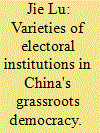

|
|
|
|
|
| Publication |
2012.
|
| Summary/Abstract |
Grassroots democracy has been practised in rural China for more than a decade. However, despite the existence of a mountain of evidence, evaluations of the quality of China's rural grassroots democracy, particularly electoral institutions, have unfortunately been inconclusive, due to primary reliance on case studies and local surveys. Moreover, the lack of comparable data over time prohibits effective studies on the evolution of grassroots democracy in Chinese villages. This article tries to provide some systematic information on how village committee elections are practised and have evolved in China, using two village surveys based on comparable national probability samples, implemented in 2002 and 2005 respectively. It further explores the validity of some key theories in contemporary literature on the uneven implementation of village committee elections in China with the help of an integrated regression model.
|
|
|
|
|
|
|
|
|
|
|
|
|
|
|
|
|
|
|
|
|